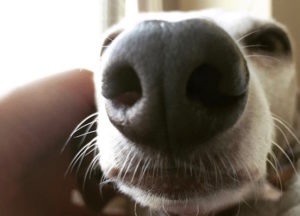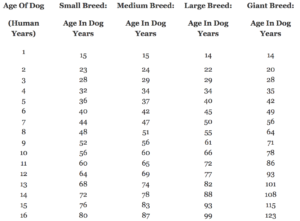“You’re good doggies. I’ll be back soon.” Ever said that? Those were my last words to my dogs this morning when I took my kids to school. Though I’d only be gone 20 minutes, I knew I’d return to whimpers and wagging tails as if I’d been gone for days. That made me wonder. Do dogs have a concept of time? We’ve all heard that one human year is like 7 dog years. Now, I’m no mathematician, but without breaking out my calculator that would mean my 20 minutes would feel like days to my pups. I know that’s not exactly how it works, but let’s take a minute and dig into your dog’s understanding of time.

The power of scent.
It’s well known that dogs have an impressive sense of smell. Just how strong? James Walker, former director of the Sensory Research Institute at Florida State University, explained it this way to PBS, “If you make the analogy to vision, what you and I can see at a third of a mile, a dog could see more than 3,000 miles away and still see as well.” In other research, Walker found that some dogs were able to scent cancerous tissue samples.
If dogs have a superpower, it would be their sense of smell and one way they use the power is to tell time. In a 60 Minutes video clip from 7 Ways to Make Your Dog Smarter, the CBS news show explained how dogs use their nose to smell changes in time. Dogs recognize that when you leave, your home is full of your scent. The longer you are gone, the more your smell dissipates. If you have a regular routine, your dog will learn that at a certain scent level, you will return home.
Even though they may be able to scent your return, some dogs suffer from separation anxiety. In his book “Pets on the Couch”, Dr. Nicholas Dodman estimates 15-17% of US dogs have separation anxiety. To help your pooch relax while you’re away, Dodman suggests some behavior changes. Make sure to leave toys, treats, and brain teasers to keep your dog occupied while you are out. When you return home, keep the greeting calm so your dog doesn’t associate your return with wild emotions.

A difference of minutes.
Pop quiz: if your dog’s understanding of time is tied to scent, do they know the difference in amounts of time? Some research says yes. A study from Applied Animal Behaviour Science found that dogs left home alone greeted their humans more enthusiastically (think: more tail wagging, attentive behavior, and with higher energy levels) after an absence of two hours than they did when their human was only gone thirty minutes. Those dogs knew they had been separated from their humans for a longer period of time.
Like humans and other animals, dogs have a 24-hour biological clock, also known as a circadian rhythm. That means dogs respond to light and dark the same way we do and if they traveled from New York to London, their bodies and brains would be confused by the time change.
University of Western Ontario Psychologist William Roberts told PetMD that dogs may use clues in their daily life like the position of the sun in the sky to keep track of time. Dogs also pick up on cues from you. This may not be an indicator of time, but dogs do understand routine and consequences. When you put on your coat and pick up your purse, your dog may understand you’re leaving for work.

What about dog years?
Now that you hopefully have a better understanding of your canine buddy’s concept of time, let’s address one more hot button issue around a dog: their age.
At one time or another, most dog lovers have probably referenced dog years. That’s the idea that one year of a human’s life is equivalent to seven years of a dog’s life. Business Insider has the facts for this case. It’s true that dogs age faster than humans, but that is only for the first few years of their lives. As they grow older, their aging slows. There’s no blanket equation to tell the “human age” of your dog. Age depends on the size of your pup. Take a look at below to get a better idea of how your dog’s years convert to human years.
According to ScienceAlert.com, “since smaller breeds tend to live longer than larger breeds, it’s important to calculate your dog’s age according to the right category: small (9.5kgs or less), medium (9.6kgs-22kgs), large (23kgs-40kgs), or giant (over 41kgs).”

Where did this notion of dog years come from? There’s no concrete answer. However, in a 2008 Wall Street Journal article, a Kansas State University veterinarian said that it may have been a marketing campaign from veterinarians to ensure pups get their regular medical checkups.
You’re On Dog Time.
So do dogs have a concept of time? Yes, but it’s not like ours. Don’t worry – you won’t be seeing a line of designer dog watches anytime soon. However, some of you dog’s awareness of time comes from their circadian rhythm, and some comes from their olfactory superpowers. If your dog struggles when you leave them alone, consider giving them puzzles with treat rewards and toys to occupy their time. And you can get a rough estimate of your dog’s age in human years, but remember, it’s not the number that matters, it how your dog feels. So take an extra few minutes and spend it with that lovable little pup.
 Toledo, United States.
Toledo, United States.